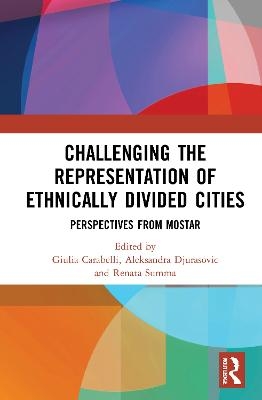
Challenging the Representation of Ethnically Divided Cities
Routledge (Verlag)
978-0-367-70724-8 (ISBN)
The book Challenging the Representation of Ethnically Divided Cities: Perspectives from Mostar questions the existing overrepresentation of Mostar as an ethnically ‘divided city’. While acknowledging the existence of internal borders, the chapters in this book assert that they are not solid nor fixed and, by exploring how they become material or immaterial, the book offers a deeper understanding of the city’s complex dynamics. Accordingly, the chapters in this book are attentive to how ethnic divides materialise or lose importance because of socio-political contingencies. Events, groups and spaces that promote reconciliation from the bottom-up are examined, not necessarily to assess their success and failures but rather to look at how they create networks, gain trust and form platforms that generate novel understandings of ethnic loyalties and party memberships.
Further, and drawing both on the empirical data and theoretical reflections, this volume contributes to broader debates about ‘divided cities’ by suggesting the need to engage with these cities in their complexities rather than reducing them to their ethno-national divisions. The book engages with socio-political and economic complexities in order to shed light on how ethnic conflicts and resulting spatial partitioning are often just the surface of much more complex dynamics that are far less easy to disentangle and represent.
The chapters in this book were originally published in Space and Polity.
Giulia Carabelli is an urban and cultural sociologist interested in grassroots politics, art and the everyday life. She is the author of The Divided City and the Grassroots: The (Un)making of Ethnic Divisions in Mostar (2018). Aleksandra Djurasovic is an urban planner/geographer focusing on post-socialist, neoliberal and war-to-peace transitions in Southeast Europe. She is the author of Ideology, Political Transitions and the City: The Case of Mostar, Bosnia and Herzegovina (2016). Renata Summa is a researcher on international relations interested in borders, boundaries, mobility and the everyday life. She is the author of Everyday Boundaries, Borders and Post Conflict Societies (forthcoming).
1. Challenging the representation of ethnically divided cities: perspectives from Mostar
Giulia Carabelli, Aleksandra Djurasovic and Renata Summa
2. Divided cities as complex cities: transition and complexity in the city of Mostar
Aleksandra Djurasovic
3. Inventing places: disrupting the ‘divided city’
Renata Summa
4. Socio-spatial agency and positive peace in Mostar, Bosnia and Herzegovina
Susan Forde
5. The politics of landscape as ways of life in the ‘divided’ city: reflections from Mostar, Bosnia–Herzegovina
Sunčana Laketa
6. Love, activism, and the possibility of radical social change in Mostar
Giulia Carabelli
7. Youth activism and dignity in post-war Mostar – envisioning a shared future through heritage
Gustav Wollentz, Marko Barišić and Nourah Sammar
8. False stories from the history of Mostar
Anja Bogojević, Amila Puzić and Mela Žuljević
| Erscheinungsdatum | 26.05.2021 |
|---|---|
| Verlagsort | London |
| Sprache | englisch |
| Maße | 174 x 246 mm |
| Gewicht | 394 g |
| Themenwelt | Sozialwissenschaften ► Politik / Verwaltung ► Europäische / Internationale Politik |
| Sozialwissenschaften ► Soziologie | |
| ISBN-10 | 0-367-70724-1 / 0367707241 |
| ISBN-13 | 978-0-367-70724-8 / 9780367707248 |
| Zustand | Neuware |
| Informationen gemäß Produktsicherheitsverordnung (GPSR) | |
| Haben Sie eine Frage zum Produkt? |
aus dem Bereich


